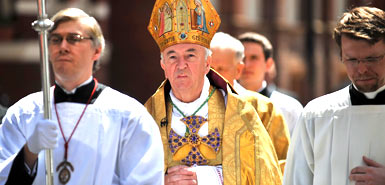The Times
May 21, 2009
http://www.timesonline.co.uk/tol/comment/faith/article6334837.ece
 |
| Vincent Nichols at Westminster Cathedral for the service to install him as leader of Catholics in England and Wales |
The new and the departing Archbishops of Westminster launched a joint offensive yesterday against atheists and secular society.
At the installation of the Most Rev Vincent Nichols at Westminster Cathedral, his predecessor, Cardinal Cormac Murphy-O’Connor, described a lack of faith as “the greatest of evils” and blamed atheism for war and destruction, implying that it was a greater evil even than sin itself. After receiving the crozier marking the office, Archbishop Nichols, glitteringly vested in newly minted gold mitre and chasuble, also defended faith against the secular agenda.
In his homily he said: “Faith in God is not, as some would portray it today, a narrowing of the human mind or spirit. It is precisely the opposite. “Faith in God is the gift that takes us beyond our limited self, with all its incessant demands . . . Some today propose that faith and reason are crudely opposed, with the fervour of faith replacing good reason. This reduction of both faith and reason inhibits not only our search for truth but also the possibility of real dialogue.”
The two-hour Mass, at the end of which Archbishop Nichols was applauded at length by the congregation of 2,000 as he processed outside to chat to onlookers in the warm sunshine, signalled the tone of an archi-episcopacy that could last for 17 years.
Archbishop Nichols, who is 63 and could remain in his post as 11th Archbishop of Westminster until his 80th birthday, gave clear signals that his main thrust as spiritual leader of the 4.2 million Catholics of England and Wales will be to secure a place for Christianity at the centre of the country’s increasingly secular society.
But furious reaction to comments that Archbishop Nichols had made about child abuse in Ireland threatened to cast a shadow over the installation. Referring to the report published on Wednesday that exposed decades of child abuse by Catholic priests and nuns in Ireland, the Archbishop had said that it took courage for religious orders and clergy to “face the facts from their past”. He also warned that the report threatened to overshadow the good done by the religious orders, chiefly the Christian Brothers and Sisters of Mercy.
Michele Elliott, the chief executive of the charity Kidscape, said: “It is ludicrous. It should be a straightforward mea culpa. It is a moral stance, and he should say that it is all about the children and the rest of them be damned.”
A spokesman for the campaign group Irish Survivors of Child Abuse also criticised his remarks.
Patrick Walsh said: “Rubbish is too kind a word for what the Archbishop has said . . . It is the verbiage of unreason, and it leaves me cold. What the Archbishop really has to do is take a long hard look at the character and nature of the people he is talking about and ask himself if they are capable of being good.”
Despite his controversial comments, Archbishop Nichols was one of the few Roman Catholic leaders to say that the perpetrators, who have been granted anonymity and may never be prosecuted, should be held to account.
In his homily at the service, Archbishop Nichols did not refer to child abuse, but pledged himself to a battle against the advancing tide of secularisation and a defence of faith.
Citing St Paul, he said that faith was not only compatible with the mind’s capacity for reasoned thought but complemented it.
“Some today propose that faith and reason are crudely opposed, with the fervour of faith replacing good reason. This reduction of both faith and reason inhibits not only our search for truth but also the possibility of real dialogue,” he added.
Cardinal Murphy-O’Connor went farther. Referring to the battles that will be won and lost in the effort to sustain the Christian presence in secular society, he said: “What is most crucial is the prayer that we express every day in the Our Father, when we say ‘deliver us from evil’. The evil we ask to be delivered from is not essentially the evil of sin, though that is clear, but in the mind of Jesus it is more importantly a loss of faith. For Jesus, the inability to believe in God and to live by faith is the greatest of evils.
“You see the things that result from this are an affront to human dignity, destruction of trust between peoples, the rule of egoism and the loss of peace. One can never have true justice, true peace, if God becomes meaningless to people.”
The Archbishop of Canterbury, Dr Rowan Williams, the Archbishop of York, Dr John Sentamu, and the Bishop of London, Richard Chartres, all attended the ceremony.
Any original material on these pages is copyright © BishopAccountability.org 2004. Reproduce freely with attribution.